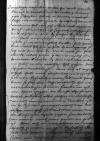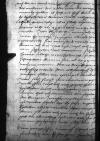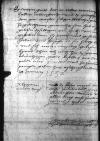Das ⌊⌋ 21 Decembris und das ⌊⌋ 3. Ianuarii peyte schreyben hab ich 20 Ianuarii empfangen. Selcher nit wenig erfreudt, dy weyl ich daraus vernomen hab, euer gesundhadt und meiner brieff uberantbortung say euch erstlich grossen danck gehabptens vleys die sachen, ⌊keyserlicher maiestadt⌋ anzuczeygen. / Und nach ⌊irer maiestadt⌋ so undertheniglich bevellen stedt zuverdinen, / und hab gern gehordt, dy anczeygung so sich mit dem orten zu ⌊Tornai⌋ verlassen hadt. Elandt etlich person, so des nit wyrdig sein, darinnen benendt, / dy dan wol etbas anderes am haltz tragen mocht(en). /
Hab pyshere das schreyben underlassen, dan ich al tag gehofft hedt, euch personlich anczusprechan, so ir mit ⌊keyserlicher maiestadt⌋ werdt herauf komen. / So sich aber seliche verczeucht, hab ich nit underlassen kun(n)en, sunder ein eygnen dyner, czeyger dis brieffs, abzufertigen, dann ir gebisslich aller sachen im entschafft von euch mocht vernemen. / Nemlich ist, das dy erst und principal ursach, was das geschra am hoff ist und was man von den ⌊kurfursten⌋ thudt sagen, sunderlich von Meintz. Auch was ⌊Peyern⌋ im spil ist. / Dan ich in einer geham ein mappa mundi, so mitten in eyne(n) keyserliche(n) adler stedt mit zweyen wappen auf itzlicher seyten, eins meins ⌊hern von Meintz⌋  AAWO, AB, D.132, f. 41v auf der ein und ⌊marggraff Jochannes⌋ auf der andern, den adler mit der mappa hidden by binding⌈[a]a hidden by binding⌉ mundi halden. / Ab selche an hoff kom(m)e bevor hidden by binding⌈[vor]vor hidden by binding⌉ dy distributiones darvon wolt ich gern [...] hidden by binding⌈[...][...] hidden by binding⌉ thudt gutten vleys, ab ir selche erfaren m[...] hidden by binding⌈[...][...] hidden by binding⌉ damit ichs in eygentlich mocht be[...] hidden by binding⌈[...][...] hidden by binding⌉ werden. / Von ⌊keyserlicher maiestadt⌋ w[...] hidden by binding⌈[...][...] hidden by binding⌉ man hy nicht zu sagen elandt idern vermandt sein maiestadt werdt nicht hidden by binding⌈[ht]ht hidden by binding⌉ komen, ab das war ist, / wyl ich aus irem schreyben wol vernemen. / Schicke hidden by binding⌈[e]e hidden by binding⌉ hymit etliche neue czeytung, so vom ⌊schweytzern⌋ komen sein. Ab dy pey euch hidden by binding⌈[h]h hidden by binding⌉ noch nit weren, das ir derselbigen a[...] hidden by binding⌈[...][...] hidden by binding⌉ talhafftig werdt, dan ich verhoff, dy [...] hidden by binding⌈[...][...] hidden by binding⌉ teutschen sellen ein exempel darab [...] hidden by binding⌈[...][...] hidden by binding⌉ was sich sunst fur neue mere pey [...] hidden by binding⌈[...][...] hidden by binding⌉ verlassen, wyl ich euch gepet(en) haben, [...] hidden by binding⌈[...][...] hidden by binding⌉ dyselben auch anzuczeygen. /
AAWO, AB, D.132, f. 41v auf der ein und ⌊marggraff Jochannes⌋ auf der andern, den adler mit der mappa hidden by binding⌈[a]a hidden by binding⌉ mundi halden. / Ab selche an hoff kom(m)e bevor hidden by binding⌈[vor]vor hidden by binding⌉ dy distributiones darvon wolt ich gern [...] hidden by binding⌈[...][...] hidden by binding⌉ thudt gutten vleys, ab ir selche erfaren m[...] hidden by binding⌈[...][...] hidden by binding⌉ damit ichs in eygentlich mocht be[...] hidden by binding⌈[...][...] hidden by binding⌉ werden. / Von ⌊keyserlicher maiestadt⌋ w[...] hidden by binding⌈[...][...] hidden by binding⌉ man hy nicht zu sagen elandt idern vermandt sein maiestadt werdt nicht hidden by binding⌈[ht]ht hidden by binding⌉ komen, ab das war ist, / wyl ich aus irem schreyben wol vernemen. / Schicke hidden by binding⌈[e]e hidden by binding⌉ hymit etliche neue czeytung, so vom ⌊schweytzern⌋ komen sein. Ab dy pey euch hidden by binding⌈[h]h hidden by binding⌉ noch nit weren, das ir derselbigen a[...] hidden by binding⌈[...][...] hidden by binding⌉ talhafftig werdt, dan ich verhoff, dy [...] hidden by binding⌈[...][...] hidden by binding⌉ teutschen sellen ein exempel darab [...] hidden by binding⌈[...][...] hidden by binding⌉ was sich sunst fur neue mere pey [...] hidden by binding⌈[...][...] hidden by binding⌉ verlassen, wyl ich euch gepet(en) haben, [...] hidden by binding⌈[...][...] hidden by binding⌉ dyselben auch anzuczeygen. /
Mit trau[...] hidden by binding⌈[...][...] hidden by binding⌉ hertzen hab ich vernome(n) den schaden, [...] hidden by binding⌈[...][...] hidden by binding⌉ der konigin junffra wyderfaren ist. Ist verbar schadt, das dy schen tugenth[...] hidden by binding⌈[...][...] hidden by binding⌉ hoheiten alsodt umb ir schens anges[...] hidden by binding⌈[...][...] hidden by binding⌉ komen sel. Aber ich pin noch der hofnung hidden by binding⌈[g]g hidden by binding⌉, Gott der almechtig sel irer artz seind[...] hidden by binding⌈[...][...] hidden by binding⌉ irs am geschicht nit schaden sel.
Vom portugesissen triumff schreyb ich n[...] hidden by binding⌈[...][...] hidden by binding⌉ sunderlich dan dysen gros fandastisch  AAWO, AB, D.132, f. 41r was dy potschaffter zu ⌊Passau⌋ guth ausricht(en), wer mir liep das selbig zuversten. /
AAWO, AB, D.132, f. 41r was dy potschaffter zu ⌊Passau⌋ guth ausricht(en), wer mir liep das selbig zuversten. /
Ich hor gern, so dy geselschafft zu euch kumbpt, das ir meiner so getreulich gedenckt. / Ich wyls warlich wyder verdinen und versult(en) und pyt euch, welledt sy al foer von meynetbegen grussen, / damit sy auch sehen, das ich ir wyder nit vergis. /
Euer ⌊⌋, so ir an mich gethan, ee ich wyder zw euch gen ⌊Brussel⌋ kam, hab ich nach langem gehabpt(en) vleys uberkomen und darinnen befinden allen vleys, des ich dan ni kan vergessenn stellen wyl und sy erst das ich nicht ein gedechtnus hinder mir gelassen hab, das meiner darpey hedt mugen gedacht werden, / dan wor ich euch eines keysers schatz gegeben hedt, hedt ich solche gehabpte muhe nicht bezahlen mugen. / Aber wan wyr Gott der almechtig auch ein mal helffen wyrdt, so wyst ir wol, das mir ungethaldt sein. /
Hymit thue ich mich euch als meinem hochsten freundt und vatter pefollen. / Mit pyt, mich ⌊keyserlicher maiestedt⌋ undertheniglich zubevehlen und mir zubissen thun, was ich erlangt hab in istis distributionib(us) ⌊Hyspaniarum⌋.
 AAWO, AB, D.132, f. 40v
AAWO, AB, D.132, f. 40v
Es were gutt, das ir etbas ⌊Mariangeli hidden by binding⌈[eli]eli hidden by binding⌉⌋ halben erlangendt und dy epitaphia dem ⌊gros cantzler⌋ seliger loblicher gedechtnus hidden by binding⌈[htnus]htnus hidden by binding⌉ zu gedechtnus gemacht sein. Hab ich gern hidden by binding⌈[gern]gern hidden by binding⌉ gelesen, dyselbigen m(ein) g(nediger) h(err) von mir hidden by binding⌈[ir]ir hidden by binding⌉ gegeben, dem sy auch wol gefallen hidden by binding⌈[n]n hidden by binding⌉ haben und gesagt, er sey solchs lob hidden by binding⌈[b]b hidden by binding⌉ und fil merer wyrdig gebesen. /
Hymit thue ich euch zu dy genad almechtigen Gottes befellen dar und hidden by binding⌈[d]d hidden by binding⌉ paldt mit freuden wel zusam(m)en pringen.
 AAWO, AB, D.132, f. 41v auf der ein und probably
AAWO, AB, D.132, f. 41v auf der ein und probably  AAWO, AB, D.132, f. 41r was dy potschaffter zu
AAWO, AB, D.132, f. 41r was dy potschaffter zu 


